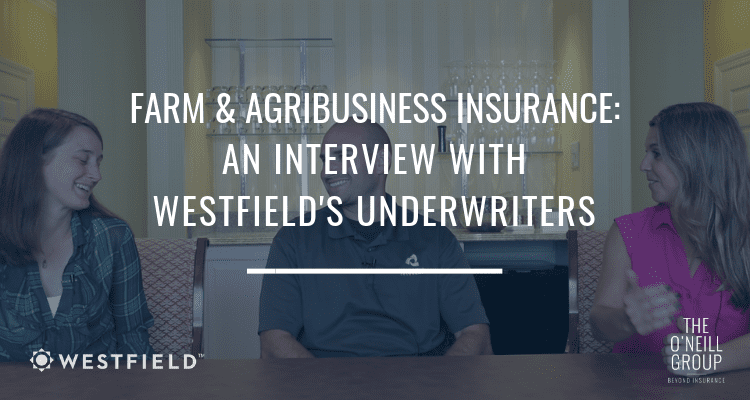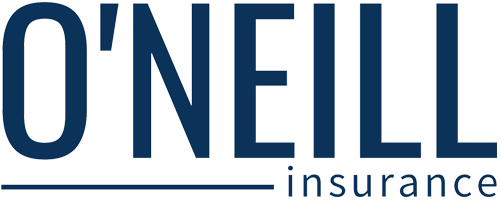
As an independent insurance agency here in Northeast Ohio, we’re located only 15 minutes away from Westfield Insurance, one of the nation’s leading insurance carriers for farm and commercial agribusiness.
Recently, we sat down with underwriters in Westfield’s Agribusiness division to learn more about the risks Ohio farmers face today, and the trends they’re seeing in the farm and agribusiness industry. In this interview you’ll hear from Field Manager, Nate Nieschwitz and Underwriter, Bethany Haynes – both of which are passionate advocates for Ohio farms, and are doing all they can to protect the industry, and to help them grow.
TOP RISKS & TRENDS THAT FARMS IN OHIO FACE TODAY
{% video_player “embed_player” overrideable=False, type=’scriptV4′, hide_playlist=True, viral_sharing=False, embed_button=False, width=’1920′, height=’1080′, player_id=’6221501777′, style=”, conversion_asset='{“type”:”CTA”,”id”:”c4da4a69-c815-4ebe-8db7-f860cfedb0ce”,”position”:”POST”}’ %}
Dani: Let’s step back and take a look at the roots and the history of Westfield Insurance and some of the initiatives you may be taking on moving forward.
Bethany: Westfield Insurance is a company that was founded 170 years ago. Our roots are in farming and throughout our 170 years we’ve always remained a piece of the farming and agribusiness community. Farming and agribusiness certainly looks a lot different now than it did 170 years ago. Agricultural technology has come into play, so we’re paying attention to how technology is impacting the industry from a risk standpoint. And there’s many agribusinesses that have grown up from that farm community that we’re still working with and focusing on today.
Dani: You touched on farms right away. In Ohio, as you know, we have so many farms in the area. What are some of the trends you’re seeing in the farm space today, and with that, what are some of the largest risks you are seeing Ohio farmers face.
Nate: When we talk about agribusiness it can be anything from small hobby farms up to large production farms and into our commercial agribusiness side which can include food manufacturing and distribution, to name a few. At the insurance level, some of the trends and challenges we’re seeing with our farmers and agribusinesses is their auto exposures. We’re seeing a lot more distracted driving on the roads, along with more miles driven. In addition, when an accident occurs the cost to repair or replace a vehicle is much higher today than it’s ever been before. Auto accidents often lead to medical costs. If someone is injured badly in an accident and ends up in the hospital, there’s going to be some high medical costs to the insured. It presents a challenge to the auto line of the farm or agribusiness and is one of the greatest risks they face.
Bethany: A few other trends we’re seeing and areas we can help with surround food safety. We want to work with our customers to make sure we have great food safety practices – whether that means controlling the point of origin or having testing in place. Technology in agriculture has changed a lot over the years, so it’s one thing to be able to acknowledge that, but it’s another to offer coverage to keep up with those changes all the time. One of the greatest risks we face as we move down the path of technology are the cyber exposures.
HOW FARMERS CAN PROTECT THEMSELVES ACROSS THE SUPPLY CHAIN
{% video_player “embed_player” overrideable=False, type=’scriptV4′, hide_playlist=True, viral_sharing=False, embed_button=False, width=’1920′, height=’1080′, player_id=’6221496479′, style=”, conversion_asset='{“type”:”CTA”,”id”:”9fc29b79-8b74-4062-956e-a626d1ca8e73″,”position”:”POST”}’ %}
Dani: What are some of the greatest risks that are spread across the supply chain, and how does it trickle down to the farmer and what can they be doing to avoid that from happening.
Nate: I think one of the most important things rests in the contract that they have so that all parties involved in the contract understand who is responsible for what. It’s really a need for good legal advice and an understanding of what you’re responsible for and what liability you could be assuming from another party. It’s a good idea to get a handle on your contracts. We know there’s times that things are done on a handshake. While that may have been fine and good practice once upon a time, it’s really a good time to get a good contractual review.
RISK MANAGEMENT STRATEGIES FOR SMALL FARMS IN OHIO
{% video_player “embed_player” overrideable=False, type=’scriptV4′, hide_playlist=True, viral_sharing=False, embed_button=False, width=’1920′, height=’1080′, player_id=’6221502473′, style=”, conversion_asset='{“type”:”CTA”,”id”:”00561131-bccb-4d98-85a7-998b67b90d5b”,”position”:”POST”}’ %}
Dani: Let’s focus on the smaller farm right now. What are some of the risk management strategies that a small Ohio farm can implement today to help them minimize risk exposures.
Bethany: As we mentioned earlier, one of our biggest risks is the auto exposure. It’s important that farmers are checking MVR’s on their drivers, and making sure they have good drivers in place. It’s also a good idea to set standards and expectations for your drivers. Whether it’s a completely formalized plan or a regular conversation.
Nate: It’s really about pre-planning and taking a look, holistically, at your operation. WE encourage Ohio farmers and commercial agribusinesses to take that approach to determine what areas you could be sued for or cause some kind of auto problem or loss to your property. On the property side, we strive to insure property owners who maintain their properties as much as possible. We understand that a farm is a farm, and depending on the particular type of farm we look for updates in an aging building and things in that nature that show there’s a proactive approach at taking care of their farm or commercial agribusiness.
Dani: As underwriters in the farm and agribusiness division, when an independent agent presents to you an executive summary of the farm or business, what kind of things do you look for to determine if this is a good fit for Westfield Insurance?
Nate: We see farms and commercial agribusinesses on a broad spectrum maybe from best case scenario to worst case scenario. So when we review a submission from the agency, we look for overall buy-in from management or ownership and their view of risk management. A lot of that buy-in is predictable from the physical attributes of the farm or agribusiness. We can see a pride of ownership through well-maintained buildings, property and equipment. We also like to get a feel for the farm or agribusinesses level of engagement and buy-in, so we consider things like: do they promote a safety culture in their operations? Are they able to identify safety hazards that could potentially cause an incident and a claim. For our larger, commercial businesses we connect them with our risk control team. At Westfield, we get the opportunities to travel out there and meet our customers and accompany our agents to help solidify that relationship. We like to make sure that our larger commercial agribusinesses understand we’re here to help them by suggesting risk management strategies to protect their company and improve their insurance program.
Bethany: At smaller operations, we simply want the process to be seamless. We want to meet their needs on a relatively efficient basis and move forward. So we’re looking for things like loss history, and making sure there hasn’t been a frequency or a severity trend. We’re also looking at their insurance score and a few high-level things to make sure it makes sense for the operation. Loss history, insurance score, and complete information on the application are all things that help us determine if this is a good fit for Westfield Insurance and allows us to respond to their needs quickly and efficiently.
about the underwriters
Bethany Haynes has been at Westfield Insurance for 10 years. She grew up in the agricultural industry and knew she wanted her career to be in something related to the agriculture industry, but she wasn’t quite sure what that looked like. She landed into the insurance industry and has enjoyed working at Westfield Insurance. Her family has her own mini-farm at home, so the work she does at Westfield Insurance ties directly to everything she’s doing at home. Her family is very involved in the agriculture industry. She enjoys having the opportunity to learn about the agriculture industry and see what’s changing in the space. To continue staying up on the latest trends and challenges facing the farm and agribusiness industry is part of her job now, it’s not just a hobby that she’s interested in.
Nathan Nieschwitz has been at Westfield Insurance for 6 years. He enjoys learning new things about the industry and understanding the unique risks of various types of farm and agribusiness operations. Nate finds the industry to be fascinating, and sees a lot of opportunity for growth in agribusiness. “There’s so much value add going into the food chain and it’s exciting to be involved in a segment that continues to grow.”
about the o’neill group
The O’Neill Group is a risk management and insurance firm in Northeast Ohio that specializes in offering risk management and insurance for the farm and agribusiness industry. Our President and CEO, Patrick O’Neill, is an Agribusiness and Farm Insurance Specialist that has had the pleasure of representing family farms and commercial agribusinesses across Ohio, including one of the largest Dairy suppliers in the region.
We understand the risks your farms and commercial agribusinesses face, and are ready to work closely with our team at Westfield Insurance to help you protect them. To learn more about our risk management and insurance program for the Farm and Agribusiness industry, call us at (330) 334-1561 or email Patrick directly at poneill@oneillinsurance.com.
This is not intended to be exhaustive nor should any discussion or opinions be construed as legal advice. Readers should contact legal counsel or an insurance professional for appropriate advice.

